I’m a fan of the website Backloggd, a Letterboxd-like for tracking and reviewing video games. My Backloggd profile isn’t as complete as my Letterboxd as far as statistics goes; I find the logging system just a little too convoluted and the database just a little too messy. Still, when I update that I beat a game, I enjoy the invitation to share my thoughts. Even when I think “I have nothing to say, so I’ll just leave a score,” it almost always extracts a diary entry from me anyway.
Recently I scrolled through all six years of my review history and discovered to my amazement… I kind of stand by some of these reviews. Most of them are duds, naturally, and most are pithy one-liners, but a handful of the extended entries made me think “I was on to something here.”
Since the series of posts I’m working on next hit a (self-inflicted, entirely preventable) delay, I figured I’d fill the gap by cleaning up some of those reviews and saving them here. Keep in mind these aren’t proper “reviews” so much as journal entries. Most of the games are relatively obscure (I had a visual novel phase in the late 2010s.). I hope the positive reviews pique your interest in the games and the negative reviews prejudice you against them forever.

Walden, a game (2017)
⭐️⭐️⭐️⭐️
Exploration/Simulation // Originally reviewed June 28, 2020
You are Henry David Thoreau. You have just moved into a cabin by Walden pond. You fish, you observe nature, and you explore the woods you now call home. After a few days, you walk down the path to your family’s house in Concord, where your mother has done your laundry.
I don’t want to re-litigate Thoreau’s laundry habits. The critics and angsty English students have done that plenty without my input. More interesting is the mere presence of the word “laundry”—a concept that isn’t referenced even once in the source text, here presented matter-of-factly to the player—which is an early signal from the game that it has a deep understanding of its source and an awareness of its criticisms. That makes it probably the best direct book to game adaptation I have played yet (and not just because of the lack of competition).
Walden is not a book about survival, and neither is this a game about survival. The punishment for failing to manage resources is minimal. Like the book, it’s a game about becoming intimately familiar with a small slice of nature, about exploring and re-exploring the same areas until specific trees become familiar. Like the book, it’s also about continuing to exist in society, not reject it. Concord itself is a significant enough hub of activity in the game that the player has the option of beginning the day in it instead of in the cabin.
The game approximates Thoreau’s visitors from the book with brief anti-slavery missions that serve to anchor the time period to a historical context but ironically lose a modicum of humanity in the translation. I imagine this was to remove the need to model and animate more humans. If that was the choice made in order to have the humans who are in the game look as good as they do, then it was the correct one.
The experiment of the book is somewhat counteracted by the need to make the game conform to certain expectations of the medium. Points of interest are marked on the map, which resulted in a couple days of my Thoreau min/maxing his stamina in order to sprint to each. Shortly before winter I realized I forgot to buy an important upgrade and spent a full day grinding out money. Those moments seem antithetical to the source material but I suppose that’s the nature of making it a game. Perhaps it’s a different kind of fail state, one where the player failed to maintain Thoreau’s narrative.
On the technical side, the game has exactly the amount of jank you’d expect from a game that launches with this many arts endowment logos. Thankfully they never impede the experience except for one area where the jank overlaps with the artistry: the voice acting. Thoreau is played by Emile Hirsch (Into the Wild, Speed Racer) in a performance so inert I was surprised to learn from the credits that not only is he professional but a voice I should have recognized. The other performances, most notably Jim Cummings as Ralph Waldo Emerson, are serviceable at worst. There’s a stark, grating gulf in emotion when the bulk of the narrative sounds like it’s being sight-read off a page yet attributed to a character for whom “inspiration” is a resource in need of active management.
But you don’t need to engage with Thoreau’s audio or even his writing, which is the beautiful part of adapting this as a video game. I’m not a particular fan of Walden (the book) but it does irk me to see people criticize it for what it was never meant to be. I worry the same will happen to Walden (a game). This is not a survival game or an exploration game. It’s a re-re-re-exploration game with some survival elements included, for you. If you want.
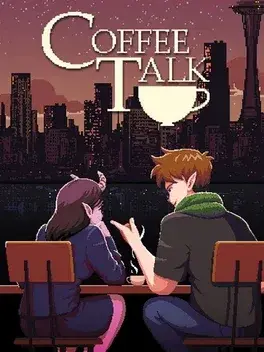
Coffee Talk (2020)
⭐️⭐️
Visual Novel // Originally reviewed June 19, 2020
The comparisons to VA-11 Hall-A are so obvious that the game lampshades them itself in the first few days. In order to evaluate this game properly on its own merits, I will not reference VA-11 Hall-A again for the rest of this review.
This game has a really compelling visual style. It has a core mechanic that is subtle enough for the game to be a visual novel yet rich enough to allow the player to make meaningful choice through it. And it completely fails to create a story worthy of either of those. In fact it is so desperate to find a story to tell that it contorts itself into a story about storytelling. The main character (excluding the player’s Barista, who is not a character) is a writer. Two other regular clients are video game developers. The writers of the game have nothing to say about writing or game development; it just seems to be the only thing they can relate to.
And even that must have been a sprint across the finish line, because the characters are as shallow as they are vague. I have no problem with short games or simple games, check out all those kinetic novels on my profile, but the allusion to a depth that isn’t there is profoundly underwhelming. Earlier when I said the player can make choices through the gameplay? I found two instances where any character reacts to the player’s choices, and only one of those affects the story. The only other gestures towards replayability are a challenge mode with frustratingly broken English (developer Toge Productions is based in Indonesia) and an achievement for sitting on a certain screen for an hour. As far as I can tell I saw everything there is to see by the end of my second playthrough.
BUT! I did play through it twice! Which brings me to maybe the main tragedy of this game. In the epilogue it teases a new revelation that I won’t spoil which encourages a second playthrough. And makes the second playthrough more interesting. And then…. that’s it. What in my opinion is the obvious hook for an exponentially more compelling narrative is actually little more than an easter egg. Toge currently has a game in Steam’s summer free demo expo, A Space for the Unbound, which (based on the demo) suffers from a similar problem and makes me worry it will be a trend with this developer. They can create characters, they can build a world, and they don’t have the confidence to see it through. They line up their dominos, knock the first one over the wrong way and give up. A funky soundtrack isn’t enough to save it. Whereas the worldbuilding and backstory express themselves naturally through the customers in VA-11 Hall-A, this game fails because it trie- oh god dammit.
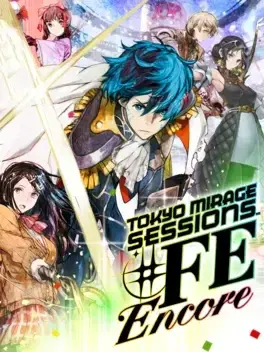
Tokyo Mirage Sessions #FE Encore (2020)
⭐️⭐️⭐️
RPG // Originally reviewed February 27, 2020
How weird is it that this exists? A SMT-like that co-opts Fire Emblem names and characters, and also it’s about J-pop. I wonder how angry Nintendo America was when Nintendo Japan told them this is what they have to sell.
I adore this game’s aesthetic. I’m a sucker for pop music in games anyway and this really incorporates it into every aspect of its style. The Session system makes the game maybe a little easy but also kinetic and showy, and that’s a trade-off I’m more than happy to make. I don’t know much about idol music but found the tunes catchy enough that I often let them play out during battles instead of skipping the animations.
It’s a shame that style isn’t present more in the actual story. The game doesn’t have any point to make about the nature of performance. In the end the villain is defeated physically but not refuted philosophically. The Cosmic Evil is summoned off-screen and once the heroes pump some DPS into it for a while the story just abruptly ends. Maybe I was expected to recognize the Big Bad from Fire Emblem which I have no experience with, but nothing else in the story relied on outside knowledge.
Other than that, it’s a very solid RPG. When asked I’ve been describing it as Persona-lite: similar mechanics and setting, but without the calendar and also 40 hours shorter. The characters are interesting enough to fill the ~50 hours this game took me to beat. All the female characters have a crush on the protagonist because unlike in Persona you can’t choose to date one so they have to cover all the bases. I might go load my endgame save and get some more achievements done.
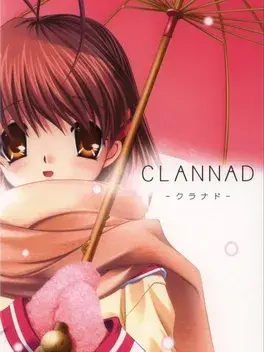
Clannad (2004)
⭐️⭐️⭐️
Visual Novel // Originally reviewed May 19, 2020, the most covid date possible
EIGHTY
FOUR
HOURS
Clannad for the longest time was considered sort of the de-facto Best Visual Novel. As in whenever discussing what the best VN is, even if no one would pick it, Clannad was the starting point of that conversation. Think of it as the same role Ocarina of Time serves for video games writ large.
I completely understand why it had that reputation. I am regrefully not well-versed in 90s Japanese VNs, so I’m speaking out of turn, but I get the sense this was one of the first successful VNs with this much artistic ambition. Considering it in its time, it’s a landmark achievement.
I also completely understand why that reputation has faded. What holds it back in my mind is, because it was an early 2000s bishojo VN, it was compelled to adhere to all of those tropes. Choices are often inane with no clear purpose for existing. The protagonist is an asshole who relies on women to save him from himself. The women are happy to oblige to absurd degrees. He is simultaneously constantly aroused and also eerily chaste? His first kiss with his wife happens about a week after their marriage. You figure that one out.
The story also often seems confused about where it’s going. Without spoiling, the “point” of the narrative was apparently such a secret that I didn’t realize what it was until it was happening. The main routes and the after story are essentially different games which isn’t inherently bad, but they don’t complement each other well. Too often callbacks fall flat in execution. In all of the most emotional scenes I caught myself thinking “There is a version of this story where this scene makes me cry. I wish I could see that one.” Credit where credit’s due, though, there’s plenty of clever foreshadowing. I recommend not skipping the Illusory World interludes when route-hunting.
I did enjoy it. It’s just hard to say how much. Maybe someday I’ll check out the anime adaptation. Perhaps the story is better suited to that medium?
This is already a really long entry so I’m gonna run up the score and rank all the main story routes from worst to best. I earned the right. Eighty four hours.
- Sunohara – lol it’s homosexual isn’t that gross ha ha kill me
- Kappei – What’s the opposite of a deus ex machina? Where everything is going well and then out of nowhere there’s a nonsense twist for the sake of drama?
- Misae – The best part of this route is when it briefly intersects with two others.
- Kotomi – “Contrived” is the word that comes to mind.
- Kyou – Kyou and Ryou are twins, and knowing that you’ve already figured out how this route goes.
- Koumura – A legitimately endearing story for a character who gets almost no screen time.
- Mei – Mei exists in the other routes as an optional B-plot and her dedicated story doesn’t really expand on it that much. Unfortunately. Mei rulez.
- Ryou – Like Kyou’s route except everything goes according to plan. I wish more stories would let that happen.
- Nagisa – Even if you don’t know the gist of the VN or looked at the cover art, this is pretty obviously the canon route.
- Yukine – Structurally unique, and all of Tomoya’s gross teenage boy energy is dumped on Sunohara instead. Almost makes me sad it’s so short, but that would mess with its pace.
- Baseball – The writing is at its best when it’s goofy, and this is by far the goofiest ending.
- Fuko – Now this is the kind of tragic existentialism I can get behind. Probably the closest the game got to making me cry. Which is saying a lot, considering, y’know. The rest of it.
- Tomoyo – Tomoyo is the most individually compelling character in the game. Comparing and contrasting her with Tomoya is some of the best storytelling in here.
Follow me here on backloggd.com to catch my Steins;Gate review when it drops in 2022.1
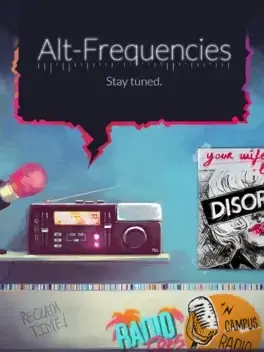
Alt-Frequencies (2022)
⭐️⭐️
Puzzle // Originally reviewed September 7, 2022
I’ve always been romantic about radio. Maybe it’s just something I internalized after watching American Graffiti so many times, but I think I would actually listen to modern radio if there was more personality (and fewer ads). That feeling that songs aren’t just being spit out by a playlist, they have to be physically started by a DJ, someone selecting the programming and keeping you company in between. You and them, alone together, before the internet made that our default state.
So a game about listening to and interacting with radio DJs immediately catches my attention, and given the inherent limitations I think it mostly works. The messages you send have to be phrases heard elsewhere, which gives it a quasi-hacker angle. The story keeps it simple and I found a handful of fun easter eggs.
But that story just didn’t engage me. This should not have been a time loop narrative. I get those are in style now and it’s an easy explanation for why the radio broadcasts are so short (a couple minutes per chapter) but… It’s a video game! No one would mind if it just repeated. Time loops are such fantastical plot devices that every time the DJs matter-of-factly discuss “the vote on the proposed time loop” it’s impossible to take seriously. I get the sense the writers weren’t quite sure where to take that story, because it ends on an anti-democratic note that’s just as disconcerting in 2022 as it should have been in 2019.
I played this on Apple Arcade and it took an hour or two. Can’t say it’s not worth it for that time and price.
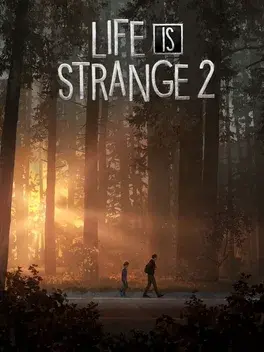
Life Is Strange 2 (2018)
⭐️⭐️⭐️⭐️
Adventure // Originally reviewed June 2, 2023
You know how kids are gross? Not like, playing with dirt and bugs gross, just an inherent background grossness. You share your game controller for 5 minutes and they hand it back sticky, why is it sticky, do your hands secrete slime?
Daniel looks gross. Visually, I can tell he’ll make my controller sticky. He’s so real. It’s an awesome accomplishment of animation and writing.
Daniel has psychic powers which go unexplained (it’s a metaphor!). He has to learn how and when to use them. You… are not Daniel. You’re his older brother. You can’t control Daniel, only influence him through your words and actions. It’s terrifying. I don’t have children so maybe this is naive, but I feel like I’ve gotten a glimpse of how scary it is to realize someone you’ve raised their whole life is indeed a person independent from you. Making Daniel a separate entity is a brilliant choice that makes story branches natural and meaningful. Gone is the “choose your ending” ending of Life Is Strange 1.
The story is about anger, and sometimes the anger directs the story instead of the other way around. The animation I praised earlier also starts to look more budget as the game goes on. Apparently there were lengthy delays between episodes when it was coming out, but that was the only seam I could spot. As a single package I loved this, and I want to replay it with different choices as soon as possible.
It’s unfair even to say “It’s unfair to compare this to LIS1.” It is, deliberately, the exact opposite of that game. I appreciate that.
- I actually played Steins;Gate later this same year. I did not leave a meaningful review. ↩


